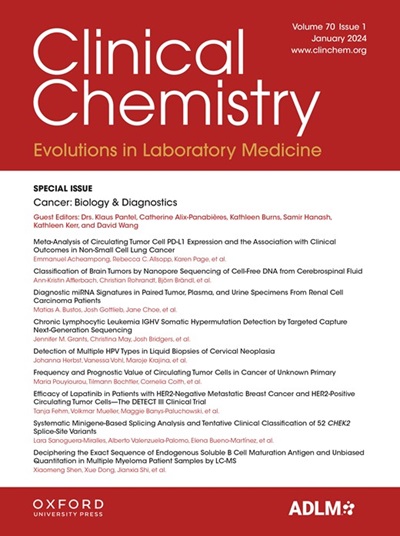B-195 Accelerating Molecular Diagnostics: Development of a novel Rapid, Integrated PCR System for Acute Respiratory Infections Detection
IF 7.1
2区 医学
Q1 MEDICAL LABORATORY TECHNOLOGY
引用次数: 0
Abstract
Background The COVID-19 pandemic and acute respiratory infections have underscored the necessity for high-throughput and timely molecular diagnostics. Existing molecular diagnostic methods are labor-intensive, a challenge particularly evident in large-scale testing. This study aims to streamline the nucleic acid testing process by integrating extraction and detection in PCR testing, thereby optimizing efficiency. Methods We developed 'EXP-160R', an integrated PCR system capable of rapid thermal cycling. This innovation employs advanced temperature control technology to markedly reduce heating, cooling, and annealing-extension times. The PCR reagent-kit (Zybio Inc.) was optimized to complement the instrument's capabilities, aiming for pathogen nucleic acid detection in acute respiratory infections within 25 minutes. The precision of in-tube temperature during rapid amplification was validated by using temperature-sensitive molecular probes in system development stage. Performance evaluation used the WHO International Standard for SARS-CoV-2 RNA to assess sensitivity and detection limits. We also analyzed 500 clinical samples from multiple Chinese hospitals, including 295 COVID-19 positives and 205 negatives, comparing the EXP-160R system's performance with an NMPA-approved PCR kit. Results The innovative system significantly improved PCR cycle times, enabling detection of 16 samples in 22 minutes and a throughput of 2400 tests per day, without compromising sensitivity or specificity. Validation confirmed a detection limit of 200 copies/mL, and the system achieved a 100% detection rate for medium and high viral load samples, with a coefficient of variation (CV) for Ct values ≤ 5%. Clinical trial comparisons with clinical standard diagnostics revealed a sensitivity of 98.05%, specificity of 100%, accuracy of 99.2%, and a Kappa coefficient of 0.984. When compared to the established PCR kit, our system showed comparable efficacy, with a sensitivity of 98.50%, specificity of 98.67%, accuracy of 98.6%, and a Kappa of 0.971. Conclusions The rapid PCR system represents a significant advancement in molecular diagnostics, offering rapid, high-throughput, and accurate detection of SARS-CoV-2. This system is particularly beneficial in urgent testing scenarios, such as airports and fever clinics. It addresses current pandemic needs and sets a new benchmark for future respiratory and infectious disease diagnostics, enhancing both efficiency and user experience.B-195 加速分子诊断:开发用于急性呼吸道感染检测的新型快速综合 PCR 系统
背景 COVID-19 大流行和急性呼吸道感染凸显了高通量和及时分子诊断的必要性。现有的分子诊断方法耗费大量人力,这在大规模检测中尤为明显。本研究旨在通过将提取和检测整合到 PCR 检测中来简化核酸检测流程,从而优化效率。方法 我们开发了 "EXP-160R",这是一种能够快速热循环的集成 PCR 系统。这项创新采用了先进的温度控制技术,大大缩短了加热、冷却和退火-延长时间。PCR 试剂盒(Zybio 公司)经过优化,与仪器的功能相得益彰,可在 25 分钟内完成急性呼吸道感染的病原体核酸检测。在系统开发阶段,使用对温度敏感的分子探针验证了快速扩增过程中试管内温度的精确性。性能评估采用世界卫生组织的 SARS-CoV-2 RNA 国际标准来评估灵敏度和检测限。我们还分析了来自中国多家医院的 500 份临床样本,包括 295 份 COVID-19 阳性样本和 205 份阴性样本,并将 EXP-160R 系统的性能与 NMPA 批准的 PCR 试剂盒进行了比较。结果 创新的系统大大缩短了 PCR 周期时间,在 22 分钟内可检测 16 个样本,每天可进行 2400 次检测,而灵敏度和特异性不受影响。验证证实检测限为 200 拷贝/毫升,该系统对中等和高病毒载量样本的检测率达到 100%,Ct 值的变异系数 (CV) ≤ 5%。临床试验与临床标准诊断比较显示,灵敏度为 98.05%,特异性为 100%,准确度为 99.2%,Kappa 系数为 0.984。与成熟的 PCR 试剂盒相比,我们的系统具有相当的功效,灵敏度为 98.50%,特异性为 98.67%,准确性为 98.6%,Kappa 为 0.971。结论 快速 PCR 系统是分子诊断领域的一大进步,可快速、高通量、准确地检测 SARS-CoV-2 。该系统尤其适用于机场和发烧诊所等紧急检测场合。它满足了当前大流行病的需求,并为未来的呼吸道和传染病诊断树立了新的基准,提高了效率和用户体验。
本文章由计算机程序翻译,如有差异,请以英文原文为准。
求助全文
约1分钟内获得全文
求助全文
来源期刊

Clinical chemistry
医学-医学实验技术
CiteScore
11.30
自引率
4.30%
发文量
212
审稿时长
1.7 months
期刊介绍:
Clinical Chemistry is a peer-reviewed scientific journal that is the premier publication for the science and practice of clinical laboratory medicine. It was established in 1955 and is associated with the Association for Diagnostics & Laboratory Medicine (ADLM).
The journal focuses on laboratory diagnosis and management of patients, and has expanded to include other clinical laboratory disciplines such as genomics, hematology, microbiology, and toxicology. It also publishes articles relevant to clinical specialties including cardiology, endocrinology, gastroenterology, genetics, immunology, infectious diseases, maternal-fetal medicine, neurology, nutrition, oncology, and pediatrics.
In addition to original research, editorials, and reviews, Clinical Chemistry features recurring sections such as clinical case studies, perspectives, podcasts, and Q&A articles. It has the highest impact factor among journals of clinical chemistry, laboratory medicine, pathology, analytical chemistry, transfusion medicine, and clinical microbiology.
The journal is indexed in databases such as MEDLINE and Web of Science.
 求助内容:
求助内容: 应助结果提醒方式:
应助结果提醒方式:


